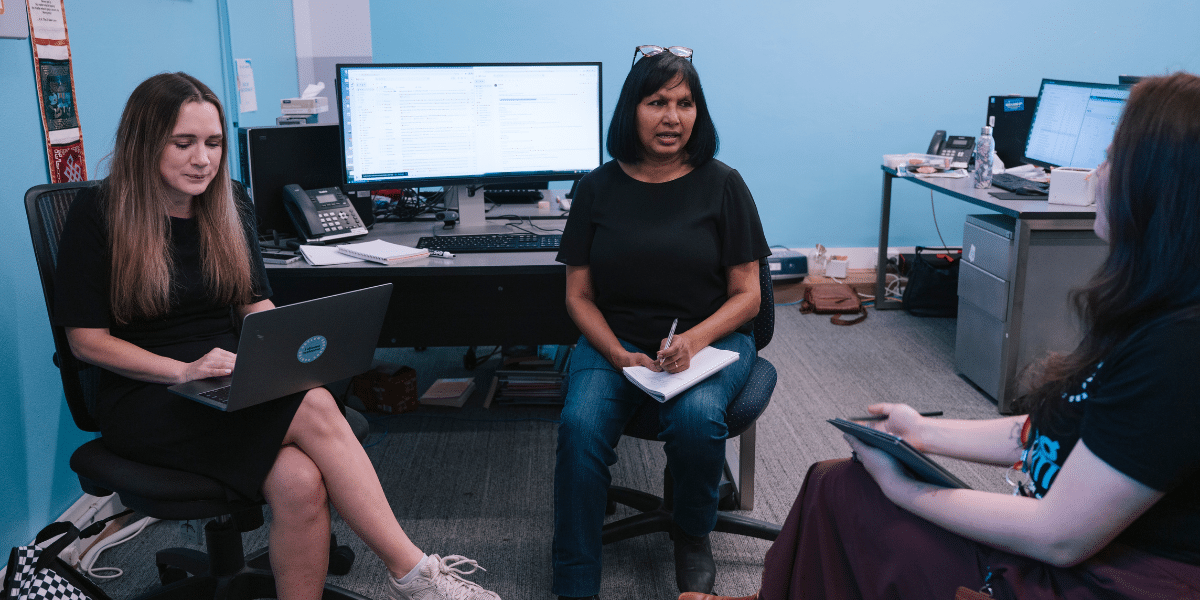ASC picks: Inspiring reads for 2026 from refugee voices
10 inspiring reads for 2026 from refugee voices A new year brings a chance to read with more intention…. Read More

Holding space: Felicia on trauma-informed care
For more than 12 years, Felicia Paul, Client Services Manager at the Asylum Seekers Centre (ASC), has supported people seeking asylum through some of their most uncertain and vulnerable moments.
With extensive experience as a caseworker, she knows that trauma-informed care is critical to supporting community members.
Felicia reflects, “When I first started in the sector, trauma-informed care wasn’t really a formalised part of practice.
“It was just about delivering a service.”
Today, she says, it’s about holding space, building trust, constant learning, and creating connections.
Meeting people where they are
Felicia describes trauma-informed care as a kind of dance, an ongoing balance between offering help and recognising when someone isn’t ready.
“You can’t go anywhere without trust. They’re not going to disclose, they’re not going to tell you what they really need. So it’s about meeting them where they’re at.”
Sometimes that begins with the most basic needs like food, shelter, or rest. Sometimes it’s deeper emotional or social support. Other times, it’s about knowing when to pause and hold space.
“You don’t want to re-traumatise. And sometimes you have to pause and evaluate how best to go forward. It might mean informing the person that we can link them up to counseling or the health team.”
Collaboration between ASC’s casework and health teams is key.
“We’re very fortunate that we have a wraparound service here. The casework and health teams work really closely together in providing that trauma-informed practice.”
The power of knowledge and training
Trauma-informed practice requires constant learning and understanding the intersection of different issues community members are vulnerable to.
“People waiting for their outcomes, going through the determination process – the waiting itself is a trauma.”
Felicia and the team go through ongoing training in trauma response, mental health, suicide prevention, and domestic violence.
“We need to be trained regularly, absolutely. Things keep changing and there are more and better practices. How we address things changes.
“With knowledge and training, you can ask better questions.”

Looking after each other
Felicia also stresses the importance of looking after the team.
“It’s important to debrief after. If someone’s gone through something difficult, I’ll check that they’re okay, suggest they go for a walk or have a coffee. We breathe.”
Debriefing ensures team members process the emotional weight of the work and maintain clarity and compassion.
“It helps you make sure you did the right thing, followed process, and looked after the person and yourself.”
Community and empowerment at the heart
Beyond services and systems, Felicia believes community is one of the most powerful parts of trauma-informed care.
“Isolation is probably one of the most dangerous things for someone going through this difficult journey.
“Helping people seeking asylum build connections is a key part of our work.
“Our organisation goes through ups and downs, through funding, no funding.
“But if we can help people be established and build a community for themselves and know how to access the help in the community and linking up, that will always be part of our core service.
“That’s the other aspect about trauma-informed care; it’s about empowering the person, as well. That’s the heart of our client-centred approach.”
For Felicia, trauma-informed care is a daily commitment to holding space with awareness, compassion, and the belief that healing happens through community.
***Support Felicia’s work and help provide trauma-informed care for people seeking asylum today. Donate HERE.
10 inspiring reads for 2026 from refugee voices A new year brings a chance to read with more intention…. Read More
At the Asylum Seekers Centre we lead with hearts and humanity. We push back against cruel policies to build a… Read More
"*" indicates required fields
